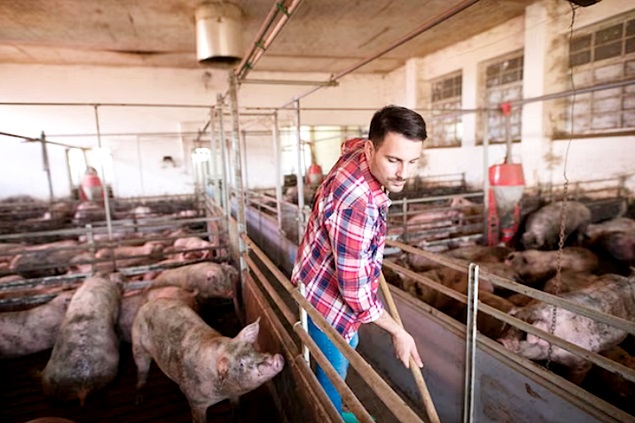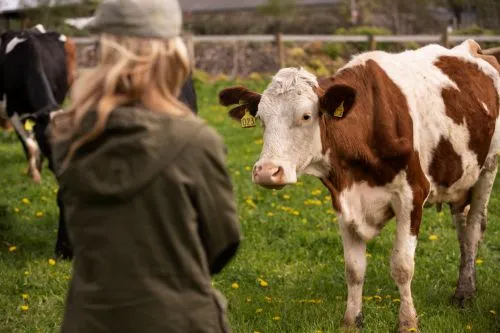1650

Over the years, the EU has established regulations that have governed the industry. How has this affected the profitability of production and the prospects for the pork market in the EU? Here is a very interesting analysis published by Pig333.
Decrease also in Poland
In the last month, the price of Polish pork has decreased as expected, not only due to declines in the German market but also due to the strengthening of the zloty against the euro. In the last week of October, the price in Poland was already below 10 PLN per kg for class E - lower than a month earlier but higher than our neighbors in the west.
What is the reason for this? - the availability of animals for slaughter. Across the Oder River, it is still higher than in Poland, which means that slaughterhouses are willing to pay more because there is already a problem with imports, as the census is a problem not only in Poland but also in many other Western European countries.
So, are we facing an increase in prices for domestic pigs? It's hard to answer unequivocally. Undoubtedly, two things speak in favor of an increase - firstly, the domestic population, and secondly, Christmas is already approaching - and this always stimulates the market for increased shopping.
These two factors will play in favor of farmers not only in Poland but also in other Western European countries. Unfortunately, there are also factors that will lead to price reductions, the most important being the situation of international pork trade.
Spain is already surpassed
Spain has been surpassed in pork trade with China by Brazil, long underestimated, which has some of the lowest production costs and, therefore, prices. Another major pork magnate from overseas, the USA, has a lower price for the finished product than the largest pork producer in Europe.
This makes pork produced in the EU unattractive for trade. For this to change, the price must decrease. Moreover, in China, due to ongoing problems with ASF, the supply of finishing pigs on the market has suddenly increased, causing the price to drop in China, so expensive pork from the EU is selling with difficulty.
If international trade does not materialize, what will happen to pork? Spain has more than it needs - they will have to send it to the European market, and they are doing it. Will this cause a drop in prices? Currently, at best, it doesn't change anything - the demand before Christmas will absorb the goods, but will this situation last forever? Certainly not.
Will the high demand continue throughout the year?
Throughout the year, there are times of higher and lower demand on the pork market. We are now entering a period where this demand is higher; however, later, this demand decreases.
Yes, immediately after that, in China, we have the New Year, which in that culture is celebrated with holidays; however, will Europe be able to penetrate this market with cheap pork from Brazil, the USA, and local pork (which plants are currently sacrificing at a lower price, surely they will be sold at a profit during the Chinese holidays)? - We doubt it.
So we should think about how to reduce costs, and unfortunately, we have a sad conclusion here. We won't be able to do that unless EU legislation changes. This is described in this article by Guillem Burset.
In Spain, 14 market sessions have ended with a reduction in the reference price, and it currently stands at 1.66 EUR per kg live weight (7.40 PLN), which is so much that you can easily get it by selling pigs at the slaughter price, and I remind you that Spain has the option to sell pork outside the EU markets. Unfortunately, in Poland, not because of ASF.
The reasons for the price drop on the Iberian Peninsula are American competition, which pushes European meat off external markets with its price, which has influenced slaughterhouses' reluctance to expand (they do not feel the pressure to buy), a larger seasonal supply, decreases in the price of components for gelatin production (everything is about organs, which are not very attractive on the meat market), and lower storage rates resulting from PRRS (plants have reduced slaughter for this reason and are not interested in increasing it now).
All of Europe is affected
According to the author of the article, these factors have been key in determining the price drop in Spain, but in my opinion, they also affect the European market - the prospect of being flooded with pork from the Iberian Peninsula is alive among European producers. This makes plants unwilling to freeze and store meat.
Currently, energy prices are high, and together with expensive pork and uncertainty about whether we will soon be flooded with meat from the West, it causes reluctance to buy pork for storage. This also affects lower demand from slaughterhouses, which prefer to continuously meet the growing supply.
This uncertainty is also evident in prices, where everyone is afraid to bend with a higher price.
So why are the costs and prices of pork production so high in Europe? Over the years, the EU has legislated to regulate the industry, as well as elements related to it.
This has not only led to a decrease in the number of animals but, more importantly, to an increase in costs - factors that make European pork less and less competitive globally.
Among these are environmental regulations, animal welfare (current discussions about increasing space, which will extend the return on investment), not to mention regulations related to energy, the price of which is increasing at an alarming rate.
These factors, in my opinion and Burset's, will result in the virtual disappearance of European pork trade on third-party markets, meaning that Europe will struggle for simple self-sufficiency.
However, ongoing free trade discussions, such as with American countries, could lead to an even worse trend.
Countries there do not have the restrictions imposed on us by European politicians and, therefore, produce more cheaply. According to the free trade formula, they will be able to enter the EU market with attractively priced pork, burying the industry on the continent even more. Will this be the case?
It depends a lot on the future elections to the European Parliament and what our representatives in Brussels will support.





